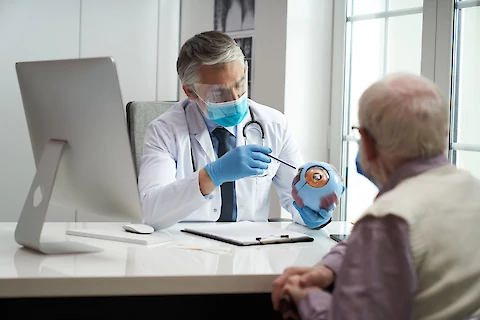
Glaucoma is a group of eye conditions that can damage the optic nerve. It is the leading cause of blindness for people over 60 and is mostly seen in older adults. It's important to recognize the risks and symptoms of glaucoma, available treatment options, and preventive measures. Senior Helpers of San Mateo has compiled an easy-to-understand guide.
What is Glaucoma?
Aside from damaging the optic nerve, glaucoma can cause high pressure in the eye, but the condition still happens with normal eye pressure. It will eventually lead to blindness, and many forms have no warning signs and can only be detected through a comprehensive dilated eye exam. If a person has glaucoma, treatment will be needed for the rest of their life.
Who is At Risk For Glaucoma?
According to the CDC, people over 60, people with diabetes, and those with a family history of glaucoma are at risk for the condition. African Americans are six to eight times more likely to develop the condition than people of another race, and people with diabetes are twice as likely to develop glaucoma than those without diabetes. Even without these risk factors, a person can develop glaucoma at any point in their life.
How is Glaucoma Treated?
The damage caused by glaucoma cannot be reversed, but steps can be taken to slow vision loss. There are a few treatment methods for the condition, along with regular check-ups at the doctor to ensure the treatment is working for you.
Treatment includes:
- Lowering intraocular pressure
- Prescription eye drops
- Oral medicine
- Laser treatment
- Surgery
Treatment options may be combined to increase the chances of slowing vision loss or other damage caused by glaucoma. For best results, take medication as prescribed and don't skip doses.
Preventing Glaucoma
While you can't entirely prevent glaucoma, there are steps you can take to lower your risk of developing the condition. Maintaining a healthy weight, staying active, controlling blood pressure, and avoiding smoking and excessive alcohol intake can all help to lower the risk of glaucoma. A healthy diet can help you maintain your weight and blood pressure.
Whether you're in a higher-risk group or not, getting a comprehensive dilated eye exam will help optometrists catch glaucoma early so it can be treated right away. The CDC recommends getting one of these exams done by age 40 and continuing to have them performed regularly to increase the chances of detecting glaucoma early.
Get At-Home Care with Senior Helpers of San Mateo
If you or a senior loved one require at-home care in San Mateo, Redwood City, Burlingame, or Millbrae, contact Senior Helpers of San Mateo today. We can provide needed companionship, help with hobbies and chores, and remind seniors to take medications while allowing seniors to maintain some independence. Senior Helpers cannot provide medical care, but we can assist those with disabilities like glaucoma and help them live everyday life with ease.